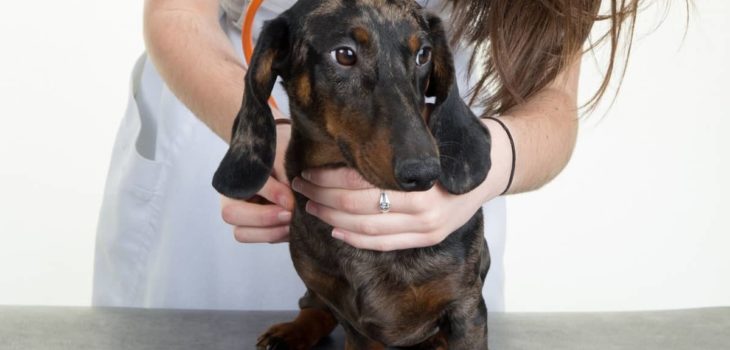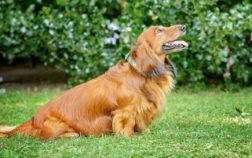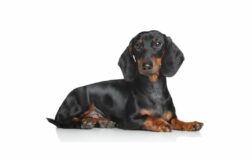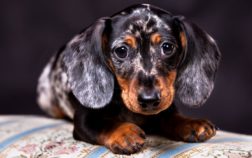Sudden hair loss is as annoying in dogs as it is in humans. It can feel even more inexplicable too. So, let’s talk about dachshund hair loss on the back – why and how to deal with it? Dogs aren’t supposed to go bald, after all. Is it a parasite, an infection, or some internal issue? Should you go to the vet or is there an easy fix? Let’s go over all the possibilities.
What Causes Dachshund Hair Loss On The Back?
Dachshunds come in three coat varieties with different hair and specifics. Neither of them is that heavy of a shedder, however, and you shouldn’t expect your dog to go outright bald from shedding. So, what’s the issue? Unfortunately, there are a great deal of possible explanations, and narrowing down between them can be difficult without a professional’s help. Fortunately, almost all of those issues are manageable once you identify them.
Here Are The Most Likely Hereditary Causes For Dachshund Bald Spots On The Back
- Dachshund Alopecia. Also called Pinnal Alopecia, this is a hereditary condition that causes pattern baldness, often on the back and the sides of the torso. It will usually begin on the outer ears but not always. If left untreated, it can eventually remove all of your dog’s hair and leave darkened skin. It doesn’t cause pain but it is unpleasant for the dog to not have fur. Melatonin and testosterone are usually recommended as treatments. There are some herbal remedies too but the effects of those are unproven.
- Color Dilution Alopecia. This is another canine Alopecia that can lead to a hairless wiener dog. Color Dilution Alopecia is most common in dachshunds with fawn and blue color coats. It’s hereditary and can also lead to almost complete hair loss. Secondary skin infections are also a possibility. Fatty acid supplements and an antibacterial shampoo are recommended most of the time.
- Acanthosis Nigricans. Another common cause for dachshund bald spots is Acanthosis Nigricans. This condition is most common in dachshunds and it can cause hair loss, thicker, darker, and leathery skin, itchiness, and occasionally – inflammations and raised wartlike areas. It’s also hereditary and there is no known cure, however, there are steroid treatments that ward off the more unpleasant symptoms.
Parasites Causing Dachshund Hair Loss On The Back
In addition to such hereditary conditions, your dachshund may also be having problems with parasites. There are many such external skin issues that can result in a lot of symptoms, including hair loss. Some of the main ones to watch out for are:
- Fleas
- Ringworm
- Chiggers
- Mosquitos
- Scabies (mange)
These and other parasites can vary in terms of severity but they are also treatable. Just get your dog to the vet as soon as you notice the bald spots or even just the itching, scratching, or the parasites themselves.

Allergic Reactions and Hair Loss On The Back Of A Dachshund
Dachshunds and all other dogs can have various skin allergies. These can be caused not just by food but also by external factors such as:
- Seasonal allergens
- The wrong shampoo
- Medications
- Accidental contact with certain chemicals or others
All in all, as in people, allergies are annoying but easy to deal with. Get your pooch to the vet, they will address the allergy, and your dog’s hair should regrow pretty soon. Then, just switch to a different shampoo, pet food, or whatever the allergy trigger was, and everything should be all right.
Internal Problems Leading To Hair Loss
In addition to the skin issues, there are also a host of possible internal medical conditions that cause hair loss too. The two most common and significant, however, especially in dachshunds are Hypothyroidism and Cushing’s Disease.
Hypothyroidism
This problem is caused by the lack of a certain thyroid hormone that’s supposed to be produced by the dachshund’s thyroid glands. Those glands are responsible for a lot of functions in the body, mostly related to the dog’s metabolism. If hypothyroidism is the underlying issue you also ought to notice a few accompanying symptoms in addition to the hair loss. These include:
- Weight gain
- Lethargy
- Cold intolerance
- Skin infections
- Scaly skin
If neither of those is present then either hypothyroidism isn’t the problem or you’re catching it very early on. In either case, if your vet suspects that this might be the issue, they will run a series of tests via blood, urine, and so on. The good news is that hypothyroidism usually just means a daily pill your dog needs to take.
Cushing’s Disease
Also called Hyperadrenocorticism, Cushing’s disease comes about because of an excess of the cortisol hormone in your dog’s system. The symptoms you need to watch for, in addition to dachshund hair loss on the back, include:
- Panting
- Weakness in the muscles
- Increased appetite
- A potbelly
- Lots of thirst and urination
- Insomnia or an infrequent sleep cycle
Fortunately, these symptoms are easy to spot and quite different from the symptoms of Hypothyroidism. Unfortunately, Cushing’s disease is pretty unpleasant to deal with. Your vet should be able to determine if that’s the issue with a simple blood test. From there, however, there may be a need for surgical intervention as Cushing’s disease is often caused by tumors on the adrenal gland. Once those are removed successfully, your vet will likely prescribe medication that also needs to be taken for the rest of the dog’s life.
In Conclusion – Dachshund Hair Loss On The Back and What You Should Do About It
Hair loss in Doxies can be caused by a lot of things – some mild and benign, others – quite detrimental. There is a cure or at least a treatment in most cases, however, so it’s important to act fast and get ahead of the problem. If you ignore the issue for too long you’ll only be doing your dog a disservice. Each of the problems above is easier to deal with if you catch it early. So, just go to your vet as soon as you can and start the healing process.
Read more about: Are Long Haired Dachshunds Double Coated Or Single Coated?




